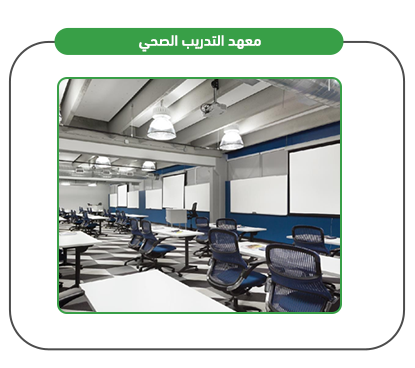A Healthcare Training Institute is a leading institution dedicated to the qualification of various healthcare professionals. It offers comprehensive programs that integrate both theoretical and practical aspects, aimed at enhancing the skills of trainees holistically. The institute utilizes the latest educational technologies and training methods, contributing to the development of students’ abilities and preparing them to tackle the growing challenges in the healthcare field. Additionally, the institute provides trainees with opportunities for hands-on training in recognized healthcare institutions, giving them a chance to apply what they’ve learned in real-world settings and gain practical experience, which significantly boosts their chances of success and excellence in their field. The institute is staffed by a team of experts and professionals who offer a rich educational experience, enhancing the quality of instruction and helping to build a strong foundation for healthcare practices. With an innovative and supportive learning environment, the Healthcare Training Institute plays a vital role in empowering individuals to develop their careers, positively impacting the quality of healthcare services provided. Consequently, the Healthcare Training Institute serves as an effective bridge between academic education and the demands of the job market.

In a world striving for comprehensive healthcare, a Health Training Institute stands as a beacon of knowledge and excellence—transcending its role as a mere educational institution to become an incubator for ambitious dreams and a creator of qualified healthcare professionals for the generations to come. The institute offers comprehensive training programs in various fields such as nursing, pharmacy, and first aid. These programs are meticulously designed to meet the growing demands of the labor market, equipping students with the skills and knowledge necessary to succeed in their professional careers.
The Health Training Institute provides an advanced learning environment, featuring a modern lecture hall and laboratories equipped with the latest technologies, allowing students to apply their theoretical knowledge in practical settings. The institute is also committed to supporting healthcare professionals by offering continuous development programs that enhance their competencies and help maintain the quality of healthcare services.
Therefore, if you aspire to a promising career in the field of healthcare, the Health Training Institute is the ideal destination to achieve your academic and professional ambitions.



Providing practical training in real-world environments
Accredited certifications that increase employment opportunities
Development of specialized medical skills
Training healthcare professionals to meet labor market demands
Experienced and qualified trainers
Continuous curriculum updates in line with the latest medical technologies
Training opportunities and hands-on experience in hospitals and healthcare facilities
Executive summary
Study project services/products
Market Size Analysis
Risk Assessment
Technical study
Financial study
Organizational and administrative study

The Education Sector in the GCC Countries
Believing in the significance of the education sector and its role in national workforce localization, Mashroo3k Economic Consultancy and Market Research is pleased to present the key educational indicators in the Gulf Cooperation Council (GCC) countries—inviting investment in this vital sector:
The total number of early childhood education students (including nurseries and kindergartens) in the GCC countries reached approximately 851.5 thousand students, according to the latest available statistics.
The number of students in school education stages is estimated at 9.3 million, with 79.4% enrolled in public schools and 20.6% in private schools.
Adult education centers recorded around 181,247 learners.
The total number of higher education students is 2,206,446.
The number of early childhood education teachers is 50,647.
The number of school education teachers is approximately 727,904.
There are 5,806 operational institutions in early childhood education.
There are 32,310 operational institutions in school education.
Over recent years, GCC governments have worked to bridge the gap between education and labor market needs. They have adopted curricula aimed at increasing the share of vocational and technical education and promoted learning through digital platforms and modern technologies. Additionally, these six countries have significantly increased their spending on education to produce graduates who meet the private sector’s workforce demands.
According to the latest statistics:
Saudi Arabia allocates 18.9% of its national budget to education.
UAE spends 14.8%,
Oman allocates 12.2%,
Bahrain spends 9.8%,
Kuwait allocates 12.3%,
Qatar spends 10.5% on education.
By 2023, the private education market in GCC countries is expected to reach a value of USD 26.2 billion.
The Global Education Sector
The global education services market was valued at approximately USD 2,882.52 billion by the end of 2021. Experts projected this figure to reach USD 3,191.79 billion by the end of 2022, marking a compound annual growth rate (CAGR) of 10.7%.
Looking ahead to 2026, the market is expected to grow further to USD 4,623.90 billion, achieving a CAGR of 9.7% over the forecast period.

By the year 2030, the global value of the education industry is projected to reach USD 10 trillion.
By 2024, the value of online education worldwide is expected to hit USD 247.46 billion.
The AI-powered education market is set to grow at a compound annual growth rate (CAGR) of 36% from 2022 to 2030.
In terms of global student numbers:
In the year 2000, there were approximately 657 million students worldwide.
By 2019, this number had increased to 739 million.
For secondary education, the number of students grew from 452 million in 2000 to 601 million in 2019.